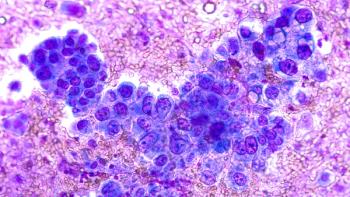
Mouse CRISPR Study Unveils Potential New Driver of Lung Metastases in Certain Cancers
When overexpressed in the mice, LRRN4CL led to a higher risk of melanoma spreading to the lungs and correlated with decreased survival.
For the first time, researchers have found a potential link between the LRRN4CL gene and cancer. Findings from a recent CRISPR study performed in mice have identified the gene as being linked to cancer metastasis to the lungs.
Overexpression of LRRN4CL in mice was associated with a higher risk of melanoma spreading to the lungs and correlated to decreased survival, the study, published in Communications Biology, found.
Using CRISPR technology, researchers screened various RNAs targeting membrane protein-encoding genes to see which cell surface molecules would drive disease spread to the lungs when upregulated.
“Upregulated LRRN4CL expression promoted lung-specific metastasis that was associated with microenvironment-stimulated cell-intrinsic downregulation of IFN signaling and upregulation of prometastatic pathways,” the investigators wrote, adding, “Interestingly, LRRN4CL is upregulated in glioma cells that express high levels of MDA9, which plays an important role in cancer progression, particularly during the invasion/metastasis stage.”
Looking further than just melanoma, the researchers were also able to confirm that the overexpression of LRRN4CL led to lung metastasis in colon, breast, and bladder cancers in mice.
“Metastasis is a complex phenomenon, and metastatic cells can have different characteristics depending on the original cancer type, the secondary tumor location and even the age of the patient,” said Louise van der Weyden, PhD, Senior Staff Scientist of the Adams Group, Experimental Cancer Genetics at Wellcome Sanger Institute, and first author of the study,
According to the researchers, reducing the overexpression of the gene with targeted therapies could prove beneficial. The gene also encodes a protein found on the surface of cancer cells, making it easier to target. This can also likely be done without severe side effects, since LRRN4C is expressed at low levels elsewhere in the body.
Reference
van der Weyden L, Harle V, Turner G, et al.CRISPR activation screen in mice identifies novel membrane proteins enhancing pulmonary metastatic colonization. Commun Biol. Published online March 23, 2021. doi:10.1038/s42003-021-01912-w
Newsletter
Stay ahead of policy, cost, and value—subscribe to AJMC for expert insights at the intersection of clinical care and health economics.









